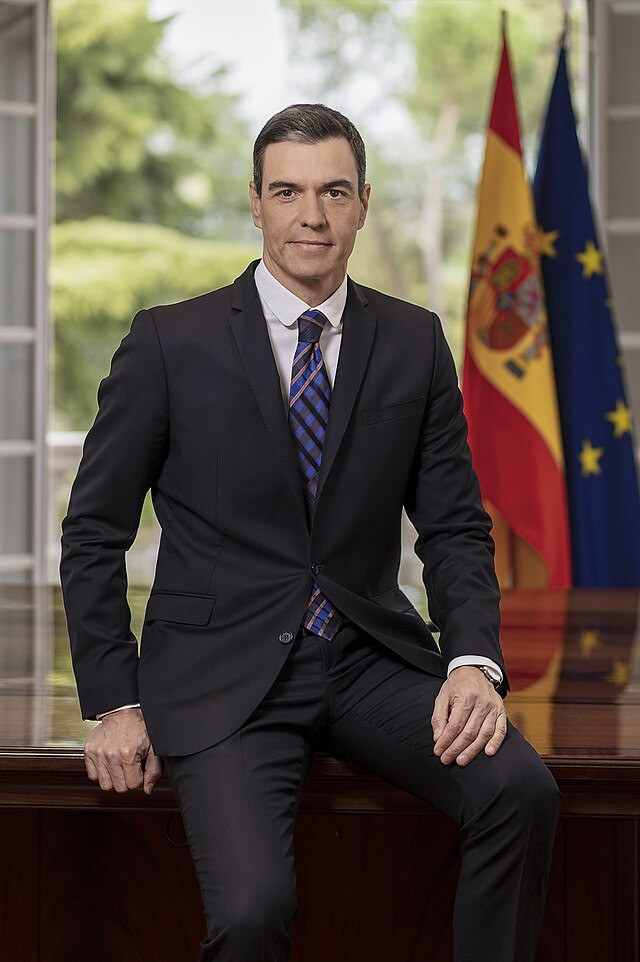Massive protests and nighttime disturbances have erupted across Spain, with demonstrators carrying banners denouncing Prime Minister Pedro Sánchez, leader of the Spanish Socialist Workers' Party, for his reelection and the amnesty agreement reached with Catalan separatists. The banners read "Sánchez Traitor" and "Don't Betray Spain."
The protests, which began last weekend and saw participation from around one million people, are the largest against the amnesty. In Madrid alone, at least 170,000 protesters gathered, including conservative People's Party leader Alberto Nunez Feijoo and far-right Vox party leader Santiago Abascal.
Last week, Sánchez, seeking the support of the Catalan party Junts for his reelection, promised to pardon individuals involved in the Catalan independence movement six years ago. In 2017, the Catalan regional government's declaration of independence, following an illegal referendum, sparked the most severe political crisis in Spain in decades, leading to strong dissatisfaction from Junts. The independence bid failed, resulting in the exile of then-Catalan President Carles Puigdemont to Belgium and the arrest of related individuals. Puigdemont was pardoned by Sánchez in 2021.
On Nov. 9, Sánchez reached an agreement with the Catalan Together for Catalonia party (JxCat), led by Puigdemont, and drafted a bill to pardon 400 individuals involved in the 2017 independence movement, including some government officials. The amnesty plan covers charges related to independence referendums in Catalonia from 2012 to 2023. The plan will be submitted to parliament in the coming days and, if approved, could be debated and voted on as early as next week.
The Spanish National Research Council (CSIC) stated that if Sánchez's proposal is approved, this amnesty would be the largest in Spain since the establishment of its democratic political system in 1977 and the first in the European Union since 1991.
The Spanish opposition has called the amnesty bill unconstitutional. People's Party leader Feijoo, in a media interview, described the amnesty as fraudulent and insulting, while Vox leader Abascal believes that the entire society must resist the approval of the amnesty proposal through ongoing social mobilization.
Spain's main business associations, in a statement, expressed concern that the agreement between Sánchez and the Catalan separatist parties, against the backdrop of an increasingly complex global business environment, could damage Spain's business market and worsen its international image.
Many Spaniards are also worried about the amnesty. A recent poll showed that 70% of voters oppose the amnesty bill, including 59% of those who voted for the Socialist Workers' Party in the early elections.
Sánchez defended the amnesty, stating that Spain needs it to promote coexistence among political parties and ease tensions in Catalonia. The Socialist Workers' Party said the amnesty aims to benefit ordinary teachers, civil servants, police officers, and firefighters prosecuted for their involvement in the 2017 Catalan independence referendum.
In addition to cooperating with Catalan separatists, the Socialist Workers' Party also agreed to form a coalition government with the Sumar party, which integrates 15 left-wing factions. Following this support, Sánchez narrowly won reelection in a parliamentary vote on Nov. 16, with 179 votes in favor and 171 against.
Sánchez's reelection ends four months of political turmoil in Spain but also exacerbates the country's divisions. Since the mid-1970s transition from dictatorship to parliamentary democracy, Spain has faced significant social rifts.
The 2008 financial crisis brought substantial economic losses to Spain, casting a shadow over existing fissures and turning the financial crisis into a profound social and political crisis. Affected by the financial crisis, Spain has implemented austerity fiscal policies since 2008. In 2014, the Spanish civil movement Podemos organized protests against the government's austerity policies, later evolving into a progressive party led by Pablo Iglesias, which won 20.7% of the vote in 2015, further polarizing Spanish politics.
In this new political landscape, the rise of the liberal Citizens party (Ciudadanos) and the nationalist Vox party has brought great instability, with the fragmented vote often hindering government formation.
For years, due to economic turmoil, political divisions, and challenges from emerging parties, "hung parliaments" have become the norm in Spain. In December 2015, although the People's Party became the largest party in parliament, it was unable to form a coalition government, leading to a second parliamentary election in May 2016.
In the July parliamentary elections, neither the opposition People's Party nor the ruling Socialist Workers' Party secured the 176 seats needed to form a government, resulting in another "hung parliament" and plunging Spain into political difficulties.
In this election, left and right parties were at odds, with irreconcilable differences in economic policies. The left-wing alliance believed that economic recovery hinged on increasing public spending, while the right-wing government called for tax cuts and a reduction in government size. Additionally, the two parties clashed on issues such as taxation, religion, immigration, and foreign affairs.
The Socialist Workers' Party, as the left-wing ruling party, was criticized by the People's Party for its high debt and budget deficit. However, its increasingly effective economic policies have stabilized its voter base. Despite high inflation and interest rates, Spain, benefiting from the EU's 140 billion euro economic recovery fund post-COVID-19, has implemented more inclusive social welfare policies under Sánchez's government, raising the minimum wage by nearly 50% in four years.






